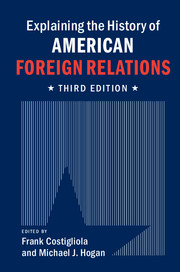Book contents
- Frontmatter
- Dedication
- Contents
- List of figures
- List of contributors
- Introduction
- 1 Theories of International Relations
- 2 National security
- 3 Corporatism: from the new era to the age of development
- 4 Explaining political economy
- 5 Diplomatic history after the big bang: using computational methods to explore the infinite archive
- 6 Development and technopolitics
- 7 Nonstate actors
- 8 Legal history as foreign relations history
- 9 Domestic politics
- 10 The global frontier: comparative history and the frontier-borderlands approach
- 11 Considering borders
- 12 The privilege of acting upon others: the middle eastern exception to anti-exceptionalist histories of the US and the world
- 13 Nationalism as an umbrella ideology
- 14 Nation Branding
- 15 Shades of sovereignty: racialized power, the United States and the world
- 16 Gendering American foreign relations
- 17 The religious turn in diplomatic history
- 18 Memory and the study of US foreign relations
- 19 The senses
- 20 Psychology
- 21 Reading for emotion
- Index
4 - Explaining political economy
Published online by Cambridge University Press: 05 March 2016
- Frontmatter
- Dedication
- Contents
- List of figures
- List of contributors
- Introduction
- 1 Theories of International Relations
- 2 National security
- 3 Corporatism: from the new era to the age of development
- 4 Explaining political economy
- 5 Diplomatic history after the big bang: using computational methods to explore the infinite archive
- 6 Development and technopolitics
- 7 Nonstate actors
- 8 Legal history as foreign relations history
- 9 Domestic politics
- 10 The global frontier: comparative history and the frontier-borderlands approach
- 11 Considering borders
- 12 The privilege of acting upon others: the middle eastern exception to anti-exceptionalist histories of the US and the world
- 13 Nationalism as an umbrella ideology
- 14 Nation Branding
- 15 Shades of sovereignty: racialized power, the United States and the world
- 16 Gendering American foreign relations
- 17 The religious turn in diplomatic history
- 18 Memory and the study of US foreign relations
- 19 The senses
- 20 Psychology
- 21 Reading for emotion
- Index
Summary
The study of political economy is a seriously neglected area of research and writing in the history of US foreign relations, and international history more generally. Political economy is the study of the relationships among business, state, and society as well as those between economics and international politics. Certain historians, broadly associated with the so-called Wisconsin School, have long focused on the economic dimensions of foreign policy, especially the quest for overseas markets. But most ignore political economy except in the most general of terms – lumping the interests of firms or corporations, banks and the health of the world economy and the global financial system among the “considerations” entertained by policymakers alongside personal, bureaucratic, or geopolitical concerns. Those who have devoted attention to economic concerns largely confine their attention to the views of policymakers, rather than broader social and economic constituencies, or to more abstract conceptions of influence rather than to the economic power of particular actors. In recent years, scholars have turned increasing attention to the role of race, gender, culture, and ideology in shaping the worldviews and policies of US officials, as well as the myriad ordinary Americans engaged with the wider world as non state actors. Yet an understanding of political economy remains essential to any narrative of US power, and to the wider world in which that power is constituted and exercised.
Given space constraints, this chapter will not offer a comprehensive theory of political economy, or suggest that there is a single road map for thinking and writing about it. Rather, we will survey some classic and some more recent works that can suggest how to more productively think, research, and write about the political economy of US foreign relations. Four interrelated dynamics are particularly important to consider: the structure of the world economy and the place of the United States in it; the role of manufacturing and extractive firms; banking and finance; and the relationship between business, state, and society.
THE WORLD ECONOMY
To understand the relationship between economics and US foreign policy, it is important to name the system – the wider field of forces in which US officials, corporations, and other actors operate. This system is a capitalist world system. The essential starting point for understanding its core features and functioning is Karl Polanyi's The Great Transformation.
- Type
- Chapter
- Information
- Explaining the History of American Foreign Relations , pp. 58 - 73Publisher: Cambridge University PressPrint publication year: 2016

